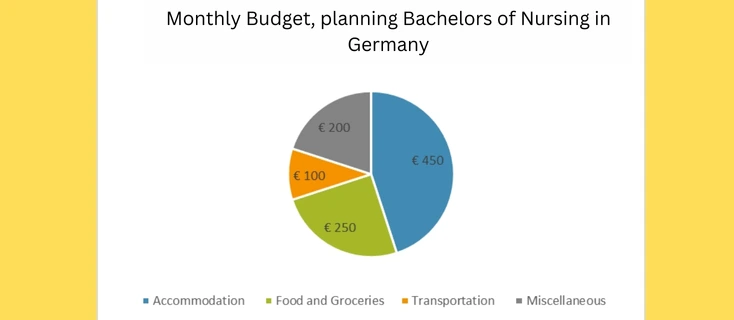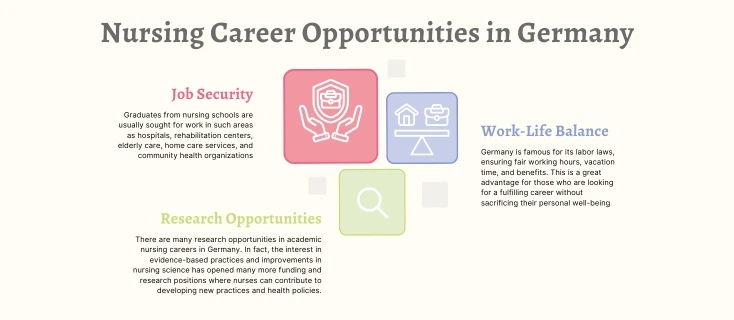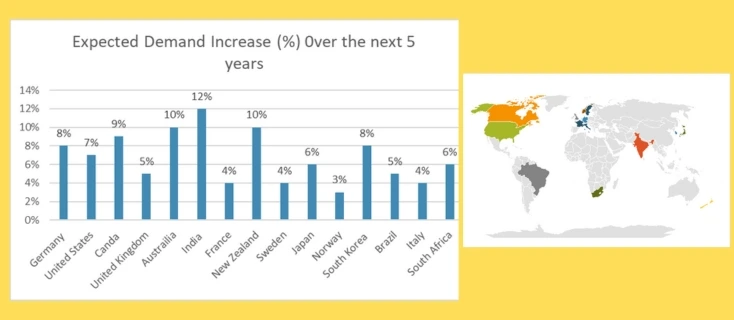Germany is known for its superior education system and health care services, with quite affordable tuition fees. A healthcare career will be a sound opportunity for students pursuing a Bachelor’s degree in nursing in Germany. The following topic in detail is given on studying in Germany: eligibility criteria to study nursing, top universities of Germany, course structure and fee, and career prospects about the education system in the country.
Eligibility Requirements for Bachelor of Nursing in Germany
For a Bachelor of Nursing course in Germany, applicants should meet the following eligibility requirements:
| Requirements | Details |
| Educational Qualification | Completion of high school equivalent to the German Abitur (12 grade). |
| Language Proficiency | Proficiency in German (at least level B2) is expected usually. |
| Health Certificate | A medical fitness certificate to confirm one’s physical fitness for nursing. |
| APS Certificate | For Indian and a few other nationalities students. |
| Additional Requirements | Basic knowledge of biology, chemistry, and healthcare practices preferred. |
Why Choose Germany for Bachelor of Nursing in Germany

- High-Quality Education: Germany is characterized by a very strict and practically oriented education system, especially within the healthcare and nursing areas.
- Affordable Tuition Fees: Tuition fees at most German public universities are either minimal or free, which makes the destination economical for international students.
- Internationally Recognized Degree: A nursing degree acquired from Germany is recognized internationally. It opens many opportunities throughout the world.
- High Demand for Nurses: There is a critical shortage of healthcare professionals in Germany, hence an ample number of jobs available for nursing graduates.
- Exposure to European Culture: Students who study in Germany will get exposed to European culture, language, and health systems.
Best Colleges offering the Bachelor of Nursing degree in Germany
Here are the lists of colleges and institutes that provide a degree in Bachelor of Nursing in Germany:
| University Name | Programs offered | Type | Language of Instruction |
| University of Freiburg | BSc in Nursing Science | Public University | German |
| Hamburg University of Applied Sciences | International Bachelor of Nursing | University of Applied Sciences | English |
| University of Bremen | BSc in Nursing Science | Public University | German |
| Essilingen University of Applied Sciences | Bachelor of Nursing and Health Sciences | University of Applied Sciences | German |
| Hochschule Bremen | Bachelor of Nursing Management | University of Applied Sciences | German |
| University of Applied Sciences Würzburg-Schweinfurt | BSc in Nursing and Health Management | University of Applied Sciences | German |
| University of Duisburg-Essen | BSc in Nursing and Research | Public University | German |
| Catholic University of Applied Sciences | Bachelor in Nursing Ethics and Care Management | University of Applied Sciences | German |
| Martin Luther University Halle-Wittenberg | BSc in Nursing and Patient Care | Public University | German |
| Witten/Herdecke University | BSc in Interdisciplinary Nursing | Private University | German/English |
| Baden-Wuerttemberg Cooperative Sate University (DHBW) | BSc in Nursing and Healthcare Management | Cooperative State University | German |
Course Structure and Curriculum
Generally, a Bachelor of Nursing program in Germany lasts about 3 to 4 years. It is designed by the integration of theoretical study into practical training. The list below provides a more accurate detail:
| Year | Focus Area | Details |
| Year 1 | Basic Nursing and Medical Sciences. | Anatomy, physiology, and introduction to nursing. |
| Year 2 | Specialized Nursing Practices and Patient Care. | Pediatric, geriatric, and psychiatric nursing. |
| Year 3 | Advanced Clinical Training and Research. | Clinical rotations and thesis work. |
| Optional | Internship Year (Optional) | Hands-on experience in hospitals or clinics. |
Key Subjects Covered
- Anatomy and Physiology
- Nursing Ethics and Communication
- Pharmacology and Medicine Administration
- Patient Assessment and Care Planning
- Healthcare Management
Post-Graduation Options
- Master’s Nursing Master’s in Nursing: After BN (Bachelor of Nursing) students can go into graduate studies and obtain Master’s in Nursing, where some more career paths open up for advanced nurses. Master’s graduate programs allow specialization in specific specializations such as clinical nurse specialists, healthcare administrators or nurse educators. Moreover advanced qualifications enhance the likelihood for better pay and supervisory and professional opportunities in healthcare service operations.
- Nursing Leadership and Management: Several programs offer a postgraduate degree in health care management for nursing professionals who seek managerial position. Nurses who have experienced a background in management are mostly in demand for hospital use, health insurance companies, and public health organizations.
- International Prospects: With a degree from Germany in the field of nursing, these students may serve in a foreign nation especially in a country such as Canada, USA, UK and Australia where more demand on nurses with proper training. In some countries, German nursing credentials are preferred so that nurses can exercise in various care settings outside Germany.
Cost of Studying Bachelor of Nursing in Germany
Germany is a relatively affordable destination to study compared to other countries. Here’s a breakdown of the expenses:
| Expense | Cost (EUR) |
| Tuition Fees | 0 – 6,000/year |
| Health Insurance | Approx. 110/month |
| Living Expenses | Approx. 850/month |
Related Post: Cost of living in Germany for Indian students
Monthly Budget Overview

Here is the overview of the Monthly Budget, planning Bachelors of Nursing in Germany:
| Category | Average Cost (Euros) |
| Accommodation | 350 – 450 |
| Food and Groceries | 150 – 250 |
| Transportation | 50 – 100 |
| Miscellaneous | 100 – 200 |
Scholarships for Bachelor of Nursing in Germany
International students can apply for various scholarships to reduce the financial burden:
- DAAD Scholarships: Tuition fees, living costs, and travel allowances are covered.
- University-specific Scholarships: Most universities provide merit-based and need-based scholarships.
- Other Funding Options: The German healthcare organizations sponsor most nursing students.
Career Prospects After Bachelor of Nursing in Germany
Germany provides great career opportunities for nursing graduates. Some job roles and salary information are as follows:
| Job Role | Average Salary (EUR/month) |
| Registered Nurse | 2,800 – 4,000 |
| Geriatric Care Specialist | 2,500 – 3,800 |
| Pediatric Nurse | 3,000 – 4,200 |
| Operating Room Nurse | 3,500 – 4,500 |
| Nursing Supervisor | 4,000 – 5,500 |
| Nurse Educator | 3,000 – 4,500 |
| Mental Health Nurse | 4,000 – 5,500 |
Global Nurse Job Demand by Specialization
| Nursing Specialization | Job Openings (%) | Factors Driving Demand |
| Registered Nurse | 45% | General nursing in hospitals, healthcare clinics, etc. |
| Nurse Practitioner | 20% | Increasing demand for advanced practice nurses in healthcare |
| ICU Nurse | 12% | Critical Care needed in intensive care units |
| Pediatric Nurse | 8% | Growing demand for children’s healthcare |
| Geriatric Nurse | 8% | Aging population, long-term care facilities |
| Mental Health Nurse | 5% | Rising mental health awareness and healthcare intiatives. |
Nursing Career Opportunities in Germany

- Job Security: Nursing is in high demand. More so, this is specifically for Germany, because there are significant shortages in the area of healthcare. Graduates from nursing schools are usually sought for work in such areas as hospitals, rehabilitation centers, elderly care, home care services, and community health organizations.
- Work-Life Balance: Nursing careers in Germany are usually structured in a way that supports good work-life balance. Germany is famous for its labor laws, ensuring fair working hours, vacation time, and benefits. This is a great advantage for those who are looking for a fulfilling career without sacrificing their personal well-being.
- Research Opportunities:There are many research opportunities in academic nursing careers in Germany. In fact, the interest in evidence-based practices and improvements in nursing science has opened many more funding and research positions where nurses can contribute to developing new practices and health policies.
Long-Term Opportunities
- Permanent Residency: After working for 2-3 years, students can apply for permanent residency in Germany.
- Higher Studies: Pursue a Master’s in Nursing or related fields like Healthcare Management.
- Global Opportunities: The degree comes with global recognition and graduates get to work in Canada, Australia, or the UK.
Bachelor of Nursing Admission Process in Germany
Here are the steps in the process:
- Research Programs: Find what universities offer a Bachelor’s of Nursing.
- Prepare documents: Academic transcripts, APS, proof of language proficiency, and an SOP.
- Apply Online: Apply through the university portal or Uni Assist.
- Interviews: Many universities may conduct interviews.
- Receive Offer Letter: If selected, you will receive an admission letter.
- Apply for a Visa: Submit the admission letter and financial proof to the German consulate.
Visa and Work Permit for Nursing Students
International students require a valid visa to enter and stay in Germany for studies and employment:
Student Visa:
- They require an admission letter, proof of financial stability, and health insurance.
- It allows international students to work part-time, which may include 20 hours a week.
Post-Graduation Work Permit:
- After graduating, students can obtain an 18-month residence permit to find employment.
- When employed, they can obtain a work visa.
Path to Permanent Resident:
- Permanent residency can be applied after several years of working.
Challenges Faced by International Students
- Language Barrier: Most nursing programs are in German, requiring proficiency in the language.
- Cultural Adjustment: Adapting to a new culture and healthcare system can be challenging.
- Rigorous Curriculum: Balancing theory and practical training demands time and effort.
Tips for Success
- Learn German Early: Start language classes well before applying.
- Utilize Internships: Gain hands-on experience during studies.
- Network: Build connections with peers and healthcare professionals.
- Manage Time: Balance academics, training, and social activities effectively.
Germany’s Healthcare System for Nursing Students
Germany’s healthcare system is renowned for its efficiency and effectiveness, making it one of the leading destinations for healthcare education, including nursing. Here’s an overview of the healthcare environment students will encounter:
- Universal Healthcare Coverage: All German residents are covered under universal healthcare. Everyone has access to medical services, regardless of their income. This is an advantage for nursing students as they can observe and be part of a highly organized and structured healthcare system.
- Advanced Medical Technology: Germany is highly advanced in medical research and technology. Students in this country who study nursing will experience state-of-the-art medical advancements, including robotic surgeries, telemedicine, and innovative patient care techniques, making it an excellent place to learn for those wanting to specialize in cutting-edge healthcare.
- Strong Focus on Preventive Care: It will show a strong focus on preventive care, including patient education and early intervention, features of the German health system. As a nursing student, this would afford an opportunity to learn holistic approaches toward healthcare, focusing more on long-term patient well-being than on treatment.
- Public and Private Healthcare Systems: The German healthcare system has both public and private health insurance. Public health covers the majority of the residents, while private health is available to those who have passed a certain threshold in terms of income. This means that nursing students will work under both systems during their clinical placements, which will widen their exposure to various healthcare settings.
Different Countries Nursing Job Demand

As of 2024, the demand for nurses globally is still very high and varies significantly from one country to another. Below is an updated dataset showing the nursing job demand, including job openings, increase percentages in demand, and median salaries for some selected countries.
| Country | Job opening for Nurses | Expected Demand Increase (%) 0ver the next 5 years |
| Germany | 40,000 | 8% |
| United States | 200,000 | 7% |
| Canda | 20,000 | 9% |
| United Kingdom | 30,000 | 5% |
| Austrailia | 25,000 | 10% |
| India | 1,500,000 | 12% |
| France | 18,000 | 4% |
| New Zealand | 5,000 | 10% |
| Sweden | 10,000 | 4% |
| Japan | 10,000 | 6% |
| Norway | 6,000 | 3% |
| South Korea | 8,000 | 8% |
| Brazil | 100,000 | 5% |
| Italy | 12,000 | 4% |
| South Africa | 30,000 | 6% |
Conclusion
A Bachelor of Nursing in Germany provides a combination of quality education, affordability, and career opportunities across the globe. With the increasing demand for healthcare professionals in Germany and around the world, the decision to pursue a nursing degree in Germany is a very rewarding one for those who care about patients and medical services. By understanding the eligibility criteria, preparing well, and using all the available resources, students can pave their way to a successful nursing career.
Related Post
B pharmacy in Germany
Dental hygienist course in Germany
Astrophysics courses in Germany
Requirements for bachelors in Germany











